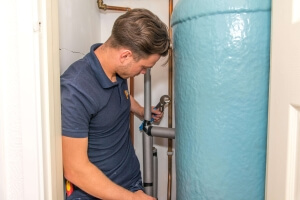
Winter can be harsh on many aspects of day-to-day life, from nature through to our immune systems, but have you considered the effects it could have caused for your plumbing? Many homes throughout the country are installed with efficient central heating systems which may have worked double-time during those icier days, whilst others may have slowly been reaching their end altogether. Take the time to run simple checks over your household plumbing this spring to ensure everything works efficiently, keeping your home comfortable and safe and prepared for next winter.
Assess your boiler
Throughout the colder months, its likely that your boiler was running on overtime to keep your home filled with warmth and hot water. Whilst this is what it is designed to do, it is always safe to check for any faults that it may have acquired over this time to ensure that it can continue working smoothly.
The first thing to check is the pressure gauge. It should be displaying a pressure of anything between 1 – 1.5. Anything outside of this range will need to be amended.
Take a moment to assess the noise your boiler is making. If it is running effortlessly, there should be no stand-out noises coming from within. However, any hissing, knocking, clicking or rattling will signal that a professional assessment and repair is required.
Tighten your hinges
When our pipes get cold, they contract, but the act of warm water flowing through results in them expanding again. This repeated action can cause our pipes to become less resilient to the winter weather each year and we may find the hinges, brackets and joints begin to loosen. This is when leaks occur. The solution to this simply involves taking regular trips around your household plumbing and ensuring that all fixtures remain secure after cold spells of weather.
Warm your pipes
In cold temperatures, both external and internal pipes can freeze over. This action can repeat daily throughout the winter months, resulting in damaging effects on our pipe work such as cracks and leaks. Insulating your pipes by use of tin foil, scarves or even hot water bottles will prevent this action from occurring and divert you from the requirement for repair on your plumbing come spring.
Examine for blockages
As previously mentioned, our external pipes often freeze over throughout winter, and this can turn standing water to ice. This act won’t always leave noticeable impacts within our home. However, the act of freezing and defrosting inside of our pipes can cause materials such as limescale and sludge to form, slowly becoming lodged and causing blockages. By paying close attention to the water pressure coming from your taps, feeling various parts of your radiators for cold spots or listening for creaking pipes, you may be able to identify if a blockage is present within your plumbing.
If you are in need of professional advice for your plumbing system this spring, or require expert repair or replacement work for any of the above issues, get in touch with our Platinum Plumbers team today. Call 020 8855 0361 or email and we will be happy to help.

